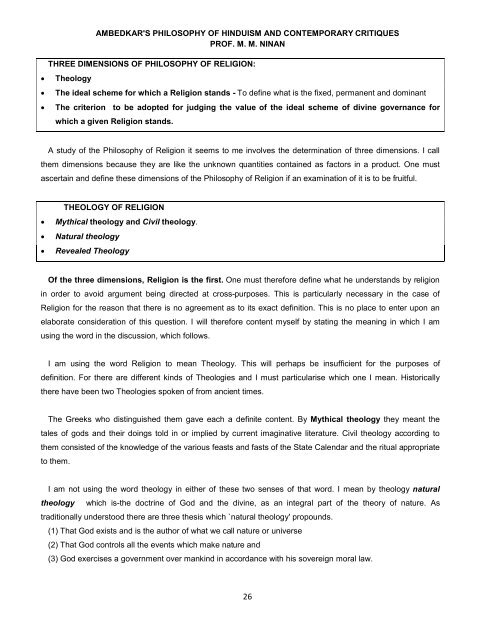Ambedkar-Philosophy of Hinduism
You also want an ePaper? Increase the reach of your titles
YUMPU automatically turns print PDFs into web optimized ePapers that Google loves.
AMBEDKAR'S PHILOSOPHY OF HINDUISM AND CONTEMPORARY CRITIQUES<br />
PROF. M. M. NINAN<br />
THREE DIMENSIONS OF PHILOSOPHY OF RELIGION:<br />
• Theology<br />
• The ideal scheme for which a Religion stands - To define what is the fixed, permanent and dominant<br />
• The criterion to be adopted for judging the value <strong>of</strong> the ideal scheme <strong>of</strong> divine governance for<br />
which a given Religion stands.<br />
A study <strong>of</strong> the <strong>Philosophy</strong> <strong>of</strong> Religion it seems to me involves the determination <strong>of</strong> three dimensions. I call<br />
them dimensions because they are like the unknown quantities contained as factors in a product. One must<br />
ascertain and define these dimensions <strong>of</strong> the <strong>Philosophy</strong> <strong>of</strong> Religion if an examination <strong>of</strong> it is to be fruitful.<br />
THEOLOGY OF RELIGION<br />
• Mythical theology and Civil theology.<br />
• Natural theology<br />
• Revealed Theology<br />
Of the three dimensions, Religion is the first. One must therefore define what he understands by religion<br />
in order to avoid argument being directed at cross-purposes. This is particularly necessary in the case <strong>of</strong><br />
Religion for the reason that there is no agreement as to its exact definition. This is no place to enter upon an<br />
elaborate consideration <strong>of</strong> this question. I will therefore content myself by stating the meaning in which I am<br />
using the word in the discussion, which follows.<br />
I am using the word Religion to mean Theology. This will perhaps be insufficient for the purposes <strong>of</strong><br />
definition. For there are different kinds <strong>of</strong> Theologies and I must particularise which one I mean. Historically<br />
there have been two Theologies spoken <strong>of</strong> from ancient times.<br />
The Greeks who distinguished them gave each a definite content. By Mythical theology they meant the<br />
tales <strong>of</strong> gods and their doings told in or implied by current imaginative literature. Civil theology according to<br />
them consisted <strong>of</strong> the knowledge <strong>of</strong> the various feasts and fasts <strong>of</strong> the State Calendar and the ritual appropriate<br />
to them.<br />
I am not using the word theology in either <strong>of</strong> these two senses <strong>of</strong> that word. I mean by theology natural<br />
theology which is-the doctrine <strong>of</strong> God and the divine, as an integral part <strong>of</strong> the theory <strong>of</strong> nature. As<br />
traditionally understood there are three thesis which `natural theology' propounds.<br />
(1) That God exists and is the author <strong>of</strong> what we call nature or universe<br />
(2) That God controls all the events which make nature and<br />
(3) God exercises a government over mankind in accordance with his sovereign moral law.<br />
26


















